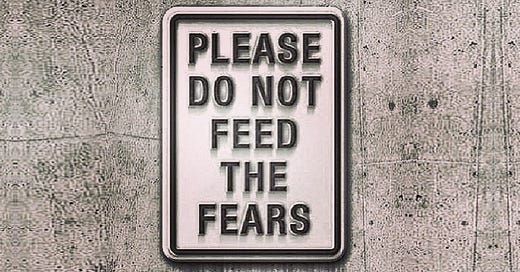Exploring every rabbit hole there is. For more wanderings, become an Alice in Futureland subscriber—it's free.
🍄 AudioDose Alice on Sonic Mushrooms: Listen to Knowing
🎧 Alice podcasts
📘 Alice books
Most of us in the modern world are raised on a metaphysic of scientific materialism, where we believe that we don’t exist as spiritual beings. During our lifespan our sense of subjectivity is based on the material firing of neurons in our brain, therefore we live in a very limited span where this life, and what happens in this life, is all that matters to us.
Hello, we’re Alice and we are always in a state of wander. It is no secret that we are living in a time of polarization and discontent. The 24/7 news cycle has consumed our spirit. But what if humans are more clever than we take credit for? With this in mind, today’s newsletter is a revisit of our 2002 conversation with Professor Robert (Bob) Thurman, a talented popularizer of the Buddha's teachings. Wander along with us! Everyone, Buddhist or not, can find truism in the interview below. We can consider the possibility that the human being is fantastic and that human embodiment is an absolute miracle. And that, perhaps, the chaos and fear that surrounds us is actually forcing human cleverness to focus on our ego paranoia instead of love, altruism, intelligence and creativity. After all, we have the creativity, we have the communication network, we have the educational ability, we know how people work, we have the meditative knowledge. We can have massive armies of enlightened people. We don’t have to be content with reading about mystics—everyone can become one. The world can use a lot of clever, fantastical, miraculous humans.
Below is an excerpt from our 2002 interview with Robert Thurman…
The Infiniverse
“There’s the view of most Native people worldwide in various forms, that there’s some form of continuity of personal subjectivity, call it spiritual, mental, whatever you will. And that means a person has a kind of infinite horizon of consequence of what they do, and there’s a sense of infinite causation or background of how they are now. And that infinite way of living, as I like to call it, or unlimited way of living, boundless way of living, creates I believe a much more responsible person. It affects our choices, it affects our sense of meaningfulness, it affects our commitment to making things work out well in a tremendous way and it’s very creative. So I use them in those two senses, sense of cosmic background and sense of personal meaningfulness, I use the concept of Infiniverse or unlimited life.”
Infinite Horizon of Consequences
“What is Infinite Horizon? Well, if I do something, better or worse, the betterness of it, meaning something good about it, it’s effect will not be lost, even though no good effect may come back to me immediately. You know someone might spurn my good effort, it might seem to fall on deaf ears, it might not work out, whatever it is. But that good cause never is lost because it’s like the law of conservation of energy, it goes on, it has an impact, and somehow its effect will emerge. Similarly if I do the worse thing, then that negative effect will never be lost. The old Buddhist metaphor is ‘a drop of water, one by one, fills a barrel.’ It actually fills an ocean in the long run. A little match, a spark, will light a forest fire and burn like thousands and hundred of thousands of acres of forest. So the tiny thing can have a massive effect in good or bad. This is very important because a lot of the irresponsibility of modern industrial society—its industries, its leaders, its individuals—is a sort of ‘who cares’ kind of attitude about things that emerge. Cynicism comes from this underlying idea that since we come to nothing in the long run, we return to oblivion whether we’re good or bad, that the chain of consequences of what we do is limited.”
Infinite Goodness
Infinite goodness? Well, infinite goodness results in infinite happiness, for self and all beings: the Buddhaverse.
“The worst of all possible worlds is the world of self-centered beings: each being is out for themselves, and therefore each one feels the rest of the world is against them. It’s what Hobbes called ‘The world of all against all,’ and it’s a totally frustrating and unsatisfying situation for any individual, because in the long run, they lose through the huge number of other individuals who are out for themselves.
The opposite of that is what we call the Buddhaverse, where all beings have become Bodhisattvas, as the Buddhists call it, or that is to say, a being of pure altruism, a being dedicated to altruistic activity. In that universe, the Buddhaverse, everybody is out to benefit everybody else. Each person is not so much out for themself, they kind of forget about themselves in the concern for all the others who have needs, but then each gains the concern of all other beings. Everybody being out for all others means everyone is out to benefit you. You’re out to benefit all of them. They multiply that manifoldly and they’re out to benefit you, and that kind of world is what’s called ‘The world of a Buddhaverse.’ I call it a Buddhaverse. The ancient Sanskrit term Buddhaksetra means a Buddha-field, and that’s the best of all possible worlds. It’s like a paradise. It means that love, in the divine sense, that love means the will for the happiness of the beloved, is what love is. So that means that everybody wants everyone else to be happy, and everyone else wants you to be happy, and with that kind of a world you have a pretty good chance of being happy. You have so much help.”
The famous Buddhist writer Shantideva said, ‘The cause of all happiness in the world is the wish for the happiness of others. The cause of all unhappiness of the world is the wish for your own happiness.’
“Western dogmatic materialists think the absolute truth—as they describe it—is being opposed by an absolute truth described by some Buddhists. That’s not the case. Actually what they say is not an absolute truth, it’s a working bunch of hypotheses and what the Buddhists say is also a working bunch of hypotheses. The Buddhist view is that the human being is embedded—that the human life form is embedded in natural life forms, and that we have a genetic relationship with animals physically, all animals, and actually some other beings that the Western materialists don’t even think exist: angels, Gods, demons, a more vast spectrum of life forms than just the animals available on the planet Earth, or even microscopic beings on the planet Earth. But the Buddha difference there is that the individual human being—myself, yourself—has been inhabiting those different animal forms because there is a subtle energy continuum, the continuum of the human, of the animals’ subjectivity and which goes through a process at death of leaving the mind that was embedded in a particular organization of senses and brain and embodiment. And goes into what they call a spiritual gene.
They use the same term, like gene, the Sanskrit word is Gotra, which is also a biological term like gene, having to do with family and lineage and gens, you know the tribe in Latin. So it actually has a very parallel root to the word gene. And so there’s something called a spiritual gene, or a mental gene if someone thinks spiritual sounds too religious. And this is the individual’s continuum. It’s like we personally have come up from Precambrian slime in the Buddhist view—like we personally have been engaged in the Darwinian embeddedness in nature. In an ironic way, the materialist people think they’re very modern—admitting our Earthiness type of thing, and not some sort of weird “pie in the sky” spirituality—by saying that we’re just genes, we just come from these genes and our brain is what we are. But actually they allow the individual an escape—not a spiritual escape, but the escape into oblivion—because the individual, as soon as the brain ceases, ceases to exist. So the individual is not actually embedded in biology, only the individual’s body.
The individual even while alive is an illusion, which can therefore escape at any time, which leads to materialist society’s cosmic, monstrous, huge irresponsibility in relation to the cosmos, the irresponsibility of industrial culture, you know in polluting, destroying, wrecking species and everything, because the individual is not embedded in that nature, actually. The Buddhist, on the other hand, has the individual as well as the collectivity and the species embedded in nature, and not only just for a while, but forever. If we recognized our total embeddedness in nature, and then begin to take responsibility for our evolutionary choices, we can then choose to create a purpose for ourselves. Buddhaness—to become Buddha—means awakened, which is the supreme form of life because you’re totally aware of everything. You’re totally aware of your relationships with others, you’re totally aware of your history, and you’re totally therefore happy.”
Morphic Resonance, Karmic Evolutionary Processes
“Morphic resonance, what does it have to do with Buddhism? Well, Buddhism is scientific, Buddhism is interested in the nature of reality, and morphic resonance has a lot to do with the history of Buddhism and the history of humanity. But in history, modern materialistic science thinks that the mind has no play in nature—it’s only epiphenomenon of the brain and it has no agency in nature. There’s no causality of mind in nature, it’s just an illusion…The mind of people isn’t really an active agency in history you see, and I think that’s very wrong. For example, if the person becomes enlightened, meaning that within their own mind, this sort of energy flow of the person, of all cycling around their own central point of being egocentrically self-involved, and that sort of circuit blows out and they become altruistic, they see through themselves, transparent to themselves, they then explode the compression cycle and the stress of being self-involved, and they become magnificently other-involved and loving towards beings. Even before an action, just the change in their mind communicates and creates what he would call a morphic field. It’s like if you’re in the presence of an unselfish person, like a Mother Theresa or a Dalai Lama, a person tends to feel a little confused, because their normal ‘I, Me, Mine, What am I doing?’—they sort of forget it. They’re kind of lifted a little temporarily into a different habit to observe things they didn’t notice before, because of the morphic resonance of the less selfish person. Even before the person has spoken, or said anything, or acted, or done any altruistic deed. In my book, Inner Revolution, I’m trying to say that the true change in human history, the true evolution of human beings in our short eye-blink of history, is that the great scientific teachers of mankind, religious teachers of mankind and spiritual teachers of mankind have had the biggest impact in history. And even today, you as a person, when you change your own mind in some way, like when you’re about to do something very selfish, and you get a little bit of an insight in your mind where you decide, ‘Hey, I’m going to control that feeling, and I’m going to give something here, and I’m going to be friendly to this person’—you have a moment of self overcoming. Even before you do that, the change in your own inner heart has a resonance and a hundred people doing that make it easier for the 200th person to do it, and the 500 people doing it make it easier for the 1000th person to do it, and so there can be a positive wave. Of course, on the other hand, for example the phenomenon of war, of mob hysteria, of mass craziness that happens, of fear and paranoia, is the opposite effect. You decide you are about to give something, and you decide to become paranoid, you hoard, you freak out, you feel angry and then suddenly everybody else feels angry. In other words, beings communicate. It’s like… a radio or television. They beam out an impulse and pattern, nobody sees it in the air, it’s a subtle energy thing, but you turn on the right receiver and transistors … and it suddenly picks up like a television program, and somebody’s talking. And that means that signal was there in the air, and there’s hundreds of stations right there, right now.
In my view of Inner Revolution, and Sheldrake’s view of Morphic Resonance, the human brain, the living animal brain, is like a television set—it has a receiver. It can decode impulses that are in the air, and not just ones that are transmitted by a course thing like a television transmitter, but that are transmitted by other brains. So messages of love can be decoded, messages of hate and fear can be decoded. And the great world teachings, scientific, spiritual—I think science is a spiritual teaching, and I think the great spiritual teachings were scientific. I think dogmatic religious institutions, religious fanaticism is not the core moving principle in all of the world religions, personally. Now I don’t say that Buddhism is the only one that is scientific—they’re all based on a deeper vision of reality in fact—but they all tend to get codified by social classes, priesthoods, dogmatic fanatics and things into some sort of obedience pattern. And then, as science is like a religion now, materialism is like a religion, materialistic scientism we could call it, is a religion. You don’t dare say ‘the mind is real’, that there is something subtle. You have to say, ‘yes it’s just matter and psychology is neuroscience and it’s finding more chemicals and that’s it.’ That’s religious—all of that, in my opinion. So anyway, that’s from Rupert Sheldrake. Very useful therefore for explaining an inner view of history as the change of the hearts of people, and therefore that view of history I think is crucially important today to see things like the enlightenment, like the Buddha’s enlightenment, like great events that happened in China, the Renaissance. Seeing these things as things that happened in peoples’ hearts primarily and then later became technologies, became material changes in society and things, because that means that we are encouraged and empowered to respect our own change of mind and heart. If we make a choice and we want to cast a vote, or we want to say no and cast a vote with our feet by leaving something, or by not buying something, or cast a vote with our wallet—we are empowered to realize that has tremendous power. Because when you say no, that resonates—and when you say yes, that resonates.”
The human being is fantastic, like a miracle.
“The human being is a miracle, and this miracle comes not from the human being being aggressive. Unfortunately, this miracle enables the human being—if they turn wrong—to be more aggressive than any other animal, until they obliterate themselves and the whole of the planet with nuclear weapons, which no normal animal can do. But that same power can be turned toward enlightenment, toward self restraint, toward self-transcending, toward evolving to be even greater in self-awareness. To become a super computer yourself, rather than just buy one. The human being is totally malleable, de-programmable, reprogrammable. They can be reprogrammed as heroes and saints, and Einsteins.”
“Every human being can be Einstein. And so, if we really realize that and we really use our technology and our notion of surplus, and our notion of control of the environment to properly control it, to grow healthy food, to share it with everyone, to educate everyone we’ll have many, many enlightened persons. And we’ll have a Buddhaverse here like no one has ever seen.”
Thank you Robert Thurman…
Craving more?
📘 Alice in Futureland books
🎧 Alice in Futureland podcasts
Thanks for tuning in.
For more wanderings, become an Alice in Futureland subscriber—it's free.
Invite your friends to this mad tea party and let's see how many things we can learn before breakfast.
©2024 Alice in Futureland









Thank you! Such a beautiful reminder of our collective power.